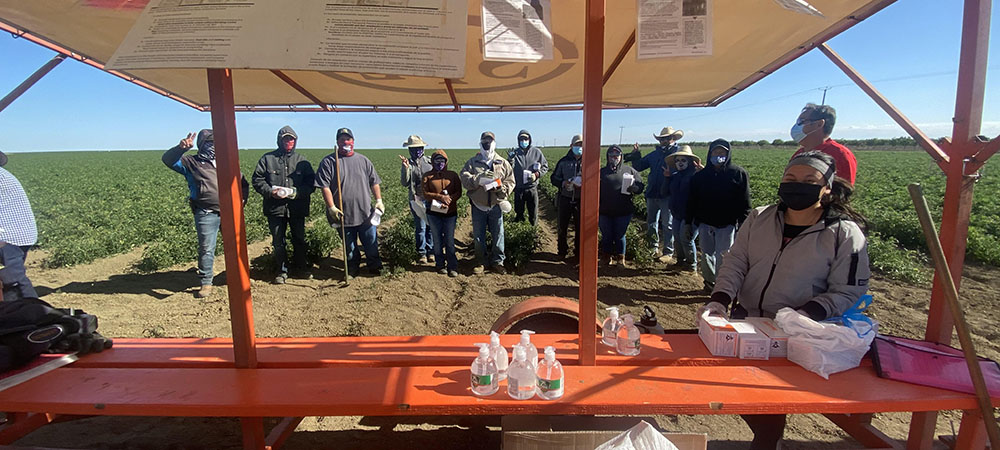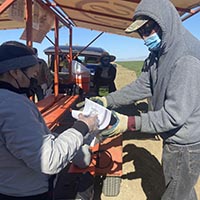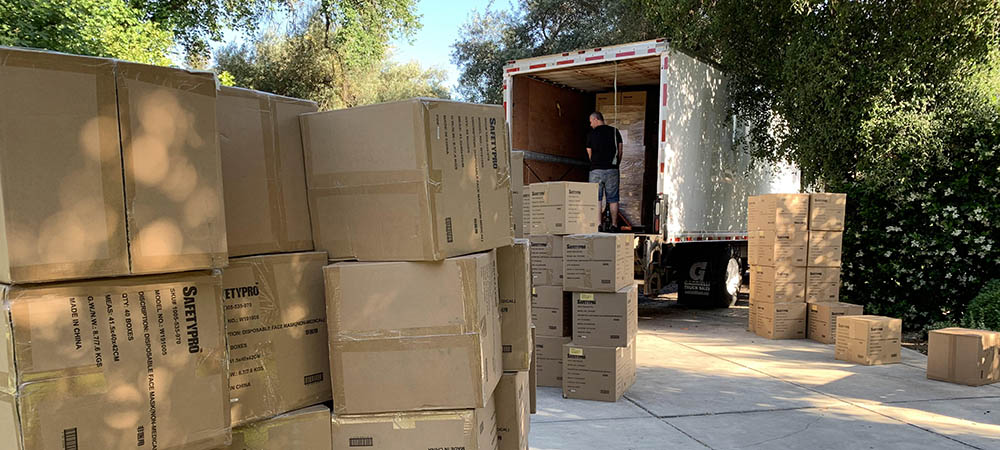
Mask and hand sanitizer distribution for Central Valley farmworkers (Photos courtesy of Eduardo González/Office of Community and Economic Development at Fresno State)
As California closes in on the designated reopening day of June 15, it’s important to remember the do-good efforts that helped get us to this point, like a recent collaboration that distributed millions of masks to farmworkers and struggling small businesses across the state.
“This project has been the highlight of my pandemic year — 1000%,” said Chelsea Irvine, former community resource manager at 3CORE, a regional economic development organization covering Butte, Glenn and Tehama counties. “It has personally brought me so much joy just because we saw a gap and we were able to fill it utilizing our partnerships and really providing a service to our small businesses, nonprofits, schools and hospitals.”
Irvine’s self-described “epic COVID project” was helping to connect sources of masks and hand sanitizer to regional organizations in California that were eager to distribute the much-needed supplies for free to small businesses, nonprofits and others.
In July 2020, the California Governor’s Office of Emergency Services (CalOES) and Governor’s Office of Business and Economic Development (GO-Biz) approached 3CORE to help distribute disposable masks and hand sanitizer to small businesses in their three-county region. After asking about other organizations in North State counties that were participating, Irvine — a representative in CA FWD’s California Stewardship Network — reached out to other economic development organizations in the Network that could also assist in the distribution. Eventually, orders were placed for 4.5 million masks and 44,000 gallons of hand sanitizer to be distributed across 19 counties.
“Every penny counts right now,” said Irvine. “COVID has decimated small businesses and these few little things have really helped make a difference.”
Irvine added that, because of these deliveries, a Sierra County director of public works and director of Office of Emergency Services was able to go business to business and drop off masks and sanitizer for the couple hundred businesses in the entire county. This kind of on-the-ground philanthropy also created added benefits for the partners in the distribution effort.
“People can be a little bit skeptical of service providers and I think you have to find a way to earn that trust and I think that this was a really great way for our economic development colleagues to earn that trust and provide a service,” said Irvine.
Fast forward to spring 2021, with the pandemic still ongoing and vaccinations just beginning to get wider distribution, businesses were asking for more masks, an essential part of safely doing business. In April, Home Depot approached the state to discuss 40 million masks which were available for donation and ready to be delivered across the country.
After CalOES asked Irvine if she would want to coordinate with Home Depot to deliver more masks, she again put out the call to regional partners in the California Stewardship Network to help distribute the blue and white masks, plus more hand sanitizer. By April 30, orders were placed for two million masks for Imperial County and 1.5 million for the eight-county region around Fresno, where truckloads of masks and hand sanitizer were then delivered for small businesses and migrant farmworkers.
Answering the call was Eduardo González, interim executive director of the Office of Community and Economic Development at Fresno State (OCED), who received and coordinated the unloading of tractor trailers with pallets of masks and hand sanitizer at his own property. Organizations would pick up from there and deliver to small businesses, and nonprofit partners would drive and distribute their shipments of masks and bottles of sanitizer to farmworkers in the fields of the Central Valley.
González noted that the timing of the distribution — closing in on California’s “reopening” — was fortunate because recipients were not only getting the masks but some education on the need to still wear and regularly replace the masks, which were a non-surgical type only meant to be worn for four hours.
“No one walks around with an ‘I got vaccinated’ shirt on,” said González. “Because you want to be protective of your family and yourself and others, they were asking participants to continue using the mask. So, this was really helpful.”
 With COVID-19 cases dropping and more people getting vaccinated, Shelby Gonzales, OCED’s finance director who oversees the organization’s small business development center, noted that there were a few instances of resistance to distributing the supplies.
With COVID-19 cases dropping and more people getting vaccinated, Shelby Gonzales, OCED’s finance director who oversees the organization’s small business development center, noted that there were a few instances of resistance to distributing the supplies.
“We did come across that mentality and we were educating the workers, where we were able to speak to them, that it’s still necessary, but even educating the owners that the need to protect their employees, in some cases, is necessary as well,” said Gonzales.
But other stories that came back to González and other participants — of nonprofits driving 20 miles to deliver to farmworkers in the fields and grateful social media posts created by small businesses — made the efforts worthwhile. For González, the partnerships at the statewide level, facilitated by the California Stewardship Network, were invaluable because of the cross-regional access to contacts who are “in the right place at the right time.”
“It’s definitely important for us to be part of the Network, not only for this type of opportunity but other opportunities, whether it’s supporting a bill at the state level or supporting a distribution of something that communities need,” said González.
As regions have been dealing with everything from fires to the pandemic, this middle-mile capacity to make connections from region to region down to the street has been critical, added Irvine.
“That’s where I just think the California Stewardship Network came in clutch because we could just reach out to this one group of people,” said Irvine. “They know what’s happening in their counties and they know where the underserved populations are and then they are able to do that last mile part of it.”
During one of the mask and sanitizer deliveries to González’s property on a 90-degree day, it was two drivers who went the extra mile and helped pull box after box by hand from a truck that didn’t have a lift on the back of its trailer.
“We told them what it was, so then they felt like they were giving back,” said González. “They were like ‘This is us giving back to community.'”

(Photos courtesy of Eduardo González/Office of Community and Economic Development at Fresno State)

